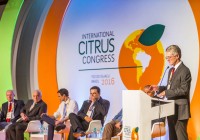13
set
Biological Institute to receive investment to research environmental impacts of agrochemicals categories: agrochemicals, Environment, Research
Contribution of R$2.2 mi was made by the Government of the State of São Paulo
The Biological Institute received an investment of R$2,246,769.40 from the Government of São Paulo to develop a research project that will monitor the environmental impacts on the application of agrochemicals in agricultural areas. The studies are expected to last three years.
The project “Environmental Impacts on the Application of Agrochemicals in Agricultural Areas” aims to assess the contamination of pesticides in several state areas. The first sites to be surveyed will be Brotas, a tourist town cut across by the Jacaré Pepira river and close to sugarcane and orange growing areas, and Ibiúna, a town near the city of São Paulo, which produces vegetables. Other regions will be selected during the course of work.
The Institute’s researchers will collect samples from soil, sediment, surface water, rivers and streams, and groundwater, such as artesian wells. The samples will be analyzed in the Laboratory of Ecology of Agrochemicals of the Biological Institute, in São Paulo, which carries out research related to the monitoring of the environment and studies on the effect of these compounds on the biome in agricultural and urban areas.
For the director of the Biological Institute, Mr. Antônio Batista Filho, the project aims to measure impacts on the use of chemicals in soil and water, and help to identify the correct management in the field. According to Ms. Eliane Vieira, an BI researcher and project coordinator, the research will reduce environmental impacts without harming agricultural productivity. “In addition, the study will collaborate on the prevention of public health problems due to the use of chemical compounds in agriculture, and will promote access to information that helps choosing the most effective and, at the same time, more affordable means to assess the quality of water,” she said.
- |

